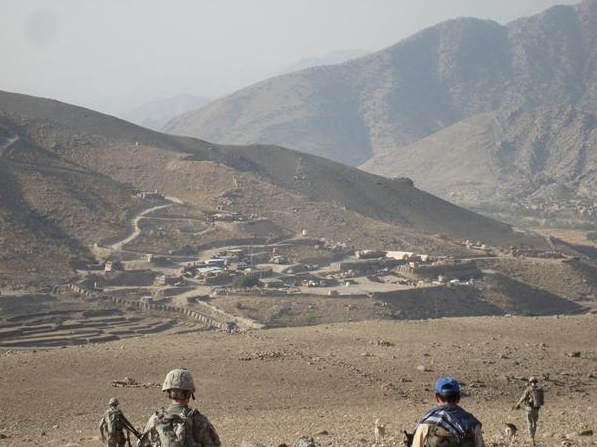 Remember those headlines about Afghan President Hamid Karzai’s plan to boot foreign mercenaries from the country? Officially, that’s still the plan. Just yesterday the AP reported that Karzai “brushed aside appeals from international officials, including U.S. Secretary of State Hillary Rodham Clinton, to reverse plans to close private security companies.”
Remember those headlines about Afghan President Hamid Karzai’s plan to boot foreign mercenaries from the country? Officially, that’s still the plan. Just yesterday the AP reported that Karzai “brushed aside appeals from international officials, including U.S. Secretary of State Hillary Rodham Clinton, to reverse plans to close private security companies.”
Despite the fuss, Karzai isn’t likely to get his way. In an earlier post, I highlighted some massive loopholes in the contractor crackdown, loopholes that were reiterated last week at a meeting of the Afghan National Security Council.
The new restrictions won’t affect mercenaries “who are responsible to provide internal security of embassies, movement of foreign diplomats [and] security of military bases.”
Meaning, the rules won’t affect anyone doing most of the things private security companies are hired to do.
Besides which, it appears the US military has no intention of abandoning its hired guns. Just check the blasé tone of the US Army procurement officers when asked about Karzai’s decree, in this fresh solicitation for armed security guards at a combat outpost east of Kabul:
[Question:] The Afghan Presidential Decree has stated that all PSCs are to cease operations in Dec 2010. Can the government provide any further clarity on the performance period for the solicitation given this directive?
Response: USFOR-A is aware of the GIRoA’s decree and is continuing to monitor the situation. However, the United States Government still has a valid, legal requirement in this solicitation for licensed, MoI-compliant armed security guards (ASG), and we intend to award a contract for performance of ASG services. We look forward to receiving and evaluating proposals from licensed, MoI compliant companies.
Translation: We don’t care what Karzai says. Homeboy is probably high, anyway. Just bribe whoever you have to in the Ministry of Interior to get your papers signed, how hard is that?
A little more detail on the contract in question:
Whatever company gets chosen will be asked to hire Afghans to man Combat Outpost Najil (pictured here in one soldier’s MySpace photo album—check those flip-flops).
[T]he contractor shall hire a minimum of 75% of its guard force from within a 50 kilometer radius of the location requiring security; subcontracting opportunities will also be afforded to those companies within 50 kilometers of the location requiring security…
In addition, Tribal Elders acceptance or “buy in” of hiring plans and subcontracting plans is essential to the success of the security operations…
The intent of this is to retain stable, civil cooperation with the local political figures within the region to sustain high levels of force protection.
The intent of recruiting unemployed young Afghan men is one thing. The reported reality—in which a Western contractor claims a profit at little personal risk, while their Afghan subcontractors pay off the warlords who really provide “security” in an area—is another.
On a more fundamental level, the financial incentives this system creates reward expedient solutions, rather than lasting ones. This particular contract’s fine print makes clear that the contractors themselves are responsible for checking the backgrounds of prospective Afghan security guards. What’s the contractor’s incentive for doing a good job? It will only cut into his bottom line.
Worse, the Army encourages short-sighted half-assedness through its own lax standards. The basic “vetting plan” for prospective guards under the contract includes asking local authorities about each candidate’s
14.1.1.1. Family History 14.1.1.2. Work History 14.1.1.3. Political standing, support the Government, etc…
“Etc.”—how thorough!
How might this process play out?
Interviewer: Do you support the government?
Interviewee: Oh, absolutely.
Interviewer: Isn’t your older brother in the Taliban?
Interviewee: I really couldn’t say.
Interviewer: I’ll just leave that one blank… So, when can you start?
Finally, a little attention must be paid to the absurdities of corporate warfare.
This solicitation is classified under “Professional, administrative, and management support services”—which makes it sound like the Army is looking for office temps to run the Xerox machines. What’s the “administrative” aspect of this contract, exactly? Counting bullets?
